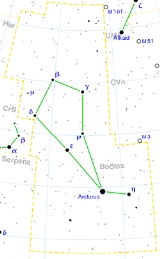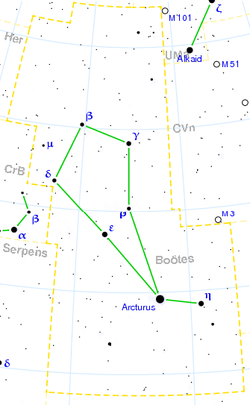
Zeta Boötis
Encyclopedia
Zeta Boötis (ζ Boo, ζ Boötis) is a bright speckle binary in the constellation of Boötes
. It also has the Flamsteed designation
30 Boötis. It is approximately 181 light years
from Earth
and has a combined apparent magnitude
of +3.78.
The angular separation of the components is currently about 0.8" (this varies slightly with orbital period). As the separation is close to the seeing limit of most astronomical observations, ζ Boötis is often used to test the performance of new high resolution imaging techniques.
 Both components are white A-type
Both components are white A-type
giants
, with apparent magnitude
s of +4.43 and +4.83.
Boötes
Boötes is a constellation in the northern sky, located between 0° and +60° declination, and 13 and 16 hours of right ascension on the celestial sphere. The name comes from the Greek Βοώτης, Boōtēs, meaning herdsman or plowman...
. It also has the Flamsteed designation
Flamsteed designation
Flamsteed designations for stars are similar to Bayer designations, except that they use numbers instead of Greek letters. Each star is assigned a number and the Latin genitive of the constellation it lies in...
30 Boötis. It is approximately 181 light years
Light Years
Light Years is the seventh studio album by Australian recording artist Kylie Minogue. It was released on 25 September 2000 by Parlophone and Mushroom Records. The album's style was indicative of her return to "mainstream pop dance tunes"....
from Earth
Earth
Earth is the third planet from the Sun, and the densest and fifth-largest of the eight planets in the Solar System. It is also the largest of the Solar System's four terrestrial planets...
and has a combined apparent magnitude
Apparent magnitude
The apparent magnitude of a celestial body is a measure of its brightness as seen by an observer on Earth, adjusted to the value it would have in the absence of the atmosphere...
of +3.78.
The angular separation of the components is currently about 0.8" (this varies slightly with orbital period). As the separation is close to the seeing limit of most astronomical observations, ζ Boötis is often used to test the performance of new high resolution imaging techniques.

Stellar classification
In astronomy, stellar classification is a classification of stars based on their spectral characteristics. The spectral class of a star is a designated class of a star describing the ionization of its chromosphere, what atomic excitations are most prominent in the light, giving an objective measure...
giants
Giant star
A giant star is a star with substantially larger radius and luminosity than a main sequence star of the same surface temperature. Typically, giant stars have radii between 10 and 100 solar radii and luminosities between 10 and 1,000 times that of the Sun. Stars still more luminous than giants are...
, with apparent magnitude
Apparent magnitude
The apparent magnitude of a celestial body is a measure of its brightness as seen by an observer on Earth, adjusted to the value it would have in the absence of the atmosphere...
s of +4.43 and +4.83.
Components
| NAME | Right ascension Right ascension Right ascension is the astronomical term for one of the two coordinates of a point on the celestial sphere when using the equatorial coordinate system. The other coordinate is the declination.-Explanation:... |
Declination Declination In astronomy, declination is one of the two coordinates of the equatorial coordinate system, the other being either right ascension or hour angle. Declination in astronomy is comparable to geographic latitude, but projected onto the celestial sphere. Declination is measured in degrees north and... |
Apparent magnitude Apparent magnitude The apparent magnitude of a celestial body is a measure of its brightness as seen by an observer on Earth, adjusted to the value it would have in the absence of the atmosphere... (V) |
Spectral type | Database references |
|---|---|---|---|---|---|
| ADS 9343 B (NSV 6766) | 14h 41m 08.9518s | +13° 43' 41.881 | 3.793 | A3IVn | Simbad |
| ADS 9343 C (HD 129246) | 14h 41m 08.5s | +13° 43' 42 | 4.83 | A2III | Simbad |
| ADS 9343 D (BD+14 2770C) | 14h 41m 01.934s | +13° 43' 23.152 | 10.9 | Simbad |

